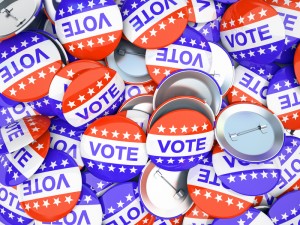
“I thought I was the only one,” the stranger said in a low voice.
It wasn’t 1957, or even 1977. It was last week, at the grand opening of a supermarket in town.
He was gray-haired, tall, dressed like a ranch hand. His smile was sheepish, his eyes conspiratorial.
He wasn’t talking about finding a kindred gay soul. He pointed to my pin, the “H” arrow of the Hillary Clinton presidential campaign. I smiled back at him. We enthused, we commiserated, we talked about the conservative places we’d moved away from. I wanted to assure him that our town was liberal, that there were more of us, but, where were the political buttons?
We were a month away from the presidential election. The stranger made me realize that I hadn’t seen anyone wearing a Clinton pin either. Or a he-who-shall-not-be-named pin. No bumper stickers. This election is intimidating: no one wants to show her or his colors.
I admit to feeling a moment of disquiet when I attached the pins to my vests. My neighbors know I’m gay and act very accepting, but there are bound to be Hillary haters in this over-fifty-five community. What was I letting myself in for?
Then the stranger told me the story of going door to door in 2008, asking permission to install Obama lawn signs in front yards. Part of his rural county borders Harney County, Oregon, where the Malheur National Wildlife Refuge Occupation took place in January, 2016. Nevertheless, he did his bit and planted those signs all day.
The very next day, said the stranger, his signs were all torn down and smashed up.
He was feeling gunshy when we met and happy to find another Clinton supporter. He asked where to get a button like mine. There was no place local so I sent him to the internet. (https://shop.hillaryclinton.
Remember the days when there were party headquarters in practically every town? Big banners on storefronts, red, white, and blue bunting. Cars with loudspeakers that trawled through neighborhoods, playing patriotic music and touting their candidates? Volunteers or even paid workers who pressed buttons on passersby? Often, the buttons were tiny tin circles you attached to clothing by folding a tab at the top?
All those funds go to TV, the USPS, and the web now. I get one to two emails a day from the Clinton campaign, not even counting Facebook and Twitter promotions. There are no face to face human appeals or exchanges. My sweetheart answered the phone the other evening and spoke for a while with a young woman about a candidate for our state election. One of the questions my sweetheart asked was, “Who is he running against?” The campaigner had no idea.
It might infuriate me to see someone wearing an opposition pin, but this graphic silence is worrisome. Is the atmosphere in the US so uncivil that we fear to speak out? When one candidate hints that assassination might solve some problems, what craziness can me and my pin expect from politically frustrated followers who are desperate to get their candidate elected?
A day or two after my encounter with the liberal stranger, a cashier at the McDonald’s drive-in spotted my pin and asked where to get one. The servers were bogged down and as I idled, she told me how worried she was that he-who-shall-not-be-named might be elected.
A friend sent two more pins. Now I have four. No, I don’t wear them all at once. I haven’t done that since my gay liberation, feminist, peace and civil rights activist days. You kind of had to back then, there was so much going on.
Every contact since then, between my pins and me and the townsfolk, has been has been heartening. The women don’t always say something, but they spot the pin, look up at me and, I swear, their eyes twinkle, or at least their crows’ feet wrinkle into smile lines. But their lips are sealed.
I still haven’t seen other Clinton buttons or bumper stickers. Maybe it’s because I don’t go out much. Yesterday, though, I saw my first he-who display. Big clean new-looking white SUV with a red, white, and blue over-sized bumper sticker. Stuck out like a very sore thumb in that parking lot full of Subarus, muddy pickups and little old Toyotas.
Has silence settled over the whole of the US? Are voters in denial of this good vs. evil election? Why aren’t we the people speaking up in ways we used to? I can’t help but wonder if some folks fear repercussions should the demagogue sit in the White House. Or perhaps it’s simply that women tend not to be boisterous in word or political gear. Are not generally raised to speak our minds.
Because the last words of the now smiling stranger in the grocery store were these: “I believe it’s the women who’ll win this one for us.”
Lee Lynch wrote the classic novels The Swashbuckler and Toothpick House. Her newest book is An American Queer: The Amazon Trail, which is a Lammy finalist. Most recently she was made namesake and first recipient of the Golden Crown Literary Society Lee Lynch Classic Award for her novel The Swashbuckler. She is also a recipient of the James Duggins Mid-Career Award in Writing, and many more honors.Books by Lee Lynch are available at women’s and gay bookstores and at boldstrokesbooks.com











